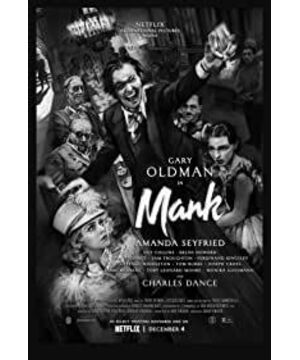1. It will feel a little trivial and dull at first, but as the timeline gradually unfolds, it will be more interesting to know more about the background and characters of Hollywood in the 1930s and 1940s. David Fincher's biopic about "Citizen Kane" screenwriter Mankiewicz, of course, is not completely objective, but the creator justifies his name. 2. The whole film deliberately imitates the image quality of the era of "Citizen Kane". It is not only produced in black and white, but most of the overall scenes are in the dark, creating a mysterious atmosphere for the lighting of the characters, which is different from "Citizen Kane". The film noir style of modeling in Kane has the same effect. In addition, the way the actors tell their lines and the style of action seem to have the characteristics of that era. However, the non-linear narrative structure and the subtitles imitating the script format still show the creator's deconstruction intention. 3. It's not just a film about Mankiewicz personally, it's about the power structure within Hollywood of that era, so much as a political throwback across America. The lame Mankiewicz is like a castrated subject in Freud's sense. He can finally stand up again and regain his ability to be independent. It is also because he made a choice to face the truth and uphold justice.
View more about Mank reviews











